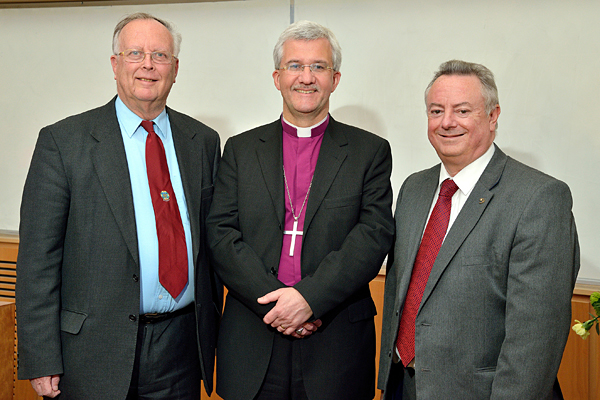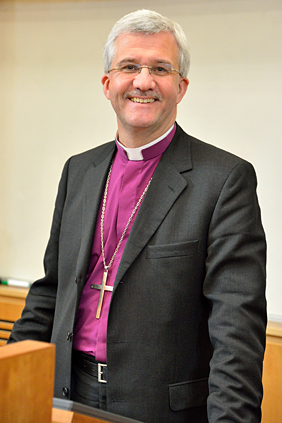The Church can regalvanise politics says Bishop of Huddersfield
 Pictured (left to right) are Professor Robin Wilson, The Rt Revd Dr Jonathan Gibbs and the University's Vice-Chancellor, Professor Bob Cryan.
Pictured (left to right) are Professor Robin Wilson, The Rt Revd Dr Jonathan Gibbs and the University's Vice-Chancellor, Professor Bob Cryan.
Fri, 24 Apr 2015 11:42:00 BST
The Rt Revd Dr Jonathan Gibbs delivered the 2015 Harold Wilson lecture
SPEAKING at a prestigious annual lecture commemorating one of Britain’s best-remembered politicians, a bishop criticised a lack of vision and direction in today’s politics and how the output from the parties has led to a “deeply depressing” election campaign.
“Politics is far too important to leave to the politicians,” said The Rt Revd Dr Jonathan Gibbs, Bishop of Huddersfield, when he delivered the annual Harold Wilson Lecture at the University of Huddersfield, in the ex-premier’s hometown.
The Bishop spoke about the role that the Church of England could play in regalvanising politics, by creating “communities of hope”.
Summarising the current election campaign, Dr Gibbs said: “For the most part I find it very difficult to work out what people actually stand for, and much of the debate is couched in intensely negative terms, focusing on instilling fear about what ‘the other lot’ might do if they get into power. It is divisive and it is corrosive – and somebody needs to say ‘Stop!’ and then to try and set us off in a different direction. And I think that is actually part of the responsibility of the Church.”
The packed audience at the University’s Diamond Jubilee Lecture Theatre was amused when Dr Gibbs recalled David Cameron’s concept of a “Big Society”, but the Bishop said that it had originally been a good idea – “though principally because it is what the Church – at its best – has been about for a very long time”.
 “Sadly the brand may have been a little tarnished – and mention of the phrase is likely to elicit little more than a groan,” continued Dr Gibbs. “But surely there is the germ of an idea here that we need to reclaim and proclaim to a society where elderly people can go weeks without speaking to anyone and where someone’s body can lie decaying in a flat for months or years before anyone even notices.”
“Sadly the brand may have been a little tarnished – and mention of the phrase is likely to elicit little more than a groan,” continued Dr Gibbs. “But surely there is the germ of an idea here that we need to reclaim and proclaim to a society where elderly people can go weeks without speaking to anyone and where someone’s body can lie decaying in a flat for months or years before anyone even notices.”
Dr Gibbs (pictured) – who is the first Bishop of Huddersfield, following diocesan re-organisation in Yorkshire – analysed what he described as the myth “that humans are concerned only or primarily with material production and consumption”.
“We all know that we are more than the sum of our bank accounts and our ability to generate income – but so much of the way we talk about life and even the quality of life is defined in terms of numbers, measurable statistics and money. Yet we all know that this is nonsense, and that real quality of life has to do far more with relationships, with family, with community,” said the Bishop.
He added that: “ Christians and the Church need to stand up for that alternative narrative and to point out how stupid and self-defeating it is to conduct our common life as if money and wealth were the only criteria for deciding what is right and good.”
Communities of hope
Dr Gibbs began his lecture with a historical analysis of the changing relationship between Church and State in Britain, leading to a situation since the 1980s in which the Church of England, although still the ‘Established Church’, was more willing “to speak truth to power”.
“The Church has re-discovered something of its prophetic voice and has sought to ask questions about where we are going as a society and where our politicians are trying to take us,” said Dr Gibbs.
He believed that churches should become “counter-cultural communities of hope, not private religious clubs” and they should “refuse the culture of fear and suspicion which so characterises much of life today”.
“That means reaching out in friendship to those who are different to us, whether in terms of race, religion, background or wealth. It means nurturing young people and adults who take responsibility for their lives and who are willing to care for others and help them in their turn to take responsibility for themselves and the world around them.”
Warm welcome
The Bishop was introduced to the audience by the Vice-Chancellor of the University of Huddersfield, Professor Bob Cryan, who said that he had already met and worked with Dr Gibbs on several occasions.
“I am delighted that the close, productive relationship that existed between our university and the former Diocese of Wakefield is now being replicated within the new diocesan framework,” said Professor Cryan.
Present at the lecture were Professor Robin Wilson – the late Lord Wilson’s son – and his wife, Joy Crispin Wilson, and Mrs Jennifer Reynolds, Lord Wilson’s granddaughter. The Bishop opened by recalling that his father had studied at the same Oxford college as Harold Wilson in the 1930s, and there was evidence that the two men knew each other.







